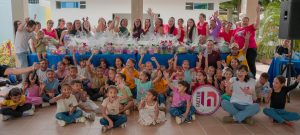Dear all – I am sure you are all aware of the importance of the Maracaibo communities in Venezuela for HD research. The incredible milestone of identifying the Huntingtin gene was possible because of the cooperation of the peoples of Venezuela. The large cluster in Maracaibo, the largest in the world as we know today, has a prevalence of HD about 1000 times higher than in the general population (up to 2.5% of all people in some areas are affected with HD). However, there are other clusters that we know of in South America, such as the ones in Colombia, Peru and Brazil. In February, myself and Claudia Perandones, a geneticist and director of the RLAH (the Latin America HD clinical network), will be visiting the communities suffering from HD in those countries. We are visiting the communities to strengthen our ties both from a scientific, medical, and humanitarian perspective (see our efforts for the Factor-H project; https://factor-h.org). Both Claudia and I will be giving talks to all the local physicians, as well as speaking directly with the patients, their caregivers, and the local authorities. Our mission is to build trust, to engage local people to help us define humanitarian and clinical management projects, and eventually prepare the communities to participate and benefit from clinical studies. I think this is the first time in many years that a visit such as this is conducted, and I believe this is the first time that a trip to Latin America includes the communities in Colombia. With the invaluable help of the local patient associations, we have crafted a trip which will be a terrific opportunity to make a change and to bring a message of hope for all those living in very difficult conditions. We will also meet with the Colombian representatives of Habitat for Humanity in Bogota, to start laying out a specific plan to build homes for those affected in Colombia. As part of our trip, we will engage the mayors and government representatives of each community, because without their cooperation, we will fail in our mission to bring change there. I am a bit nervous about this trip, which I suspect will be extremely difficult emotionally: 9 days, 8 communities, and several internal flights later, I hope that this is the beginning of a fruitful collaboration.
Scientifically and medically, the Latin American communities will be extremely important, once again, in our quest to treat HD. The large number of patients and their unaffected relatives living in concentrated, well-defined geographical areas, will enable (assuming their consent to work with us) a greater understanding of how genetic and environmental factors affect the symptoms and the progression of the disease. At the same time, by building these communities, we hope to provide access to better medical care, train the local physicians and caregivers to improve the quality of life of all living in these areas. I will posting regularly here and on the Factor-H website about the details of the trip and my reflections during this exciting moment. Please follow me and continue to support our efforts to bring change to all affected by HD.





